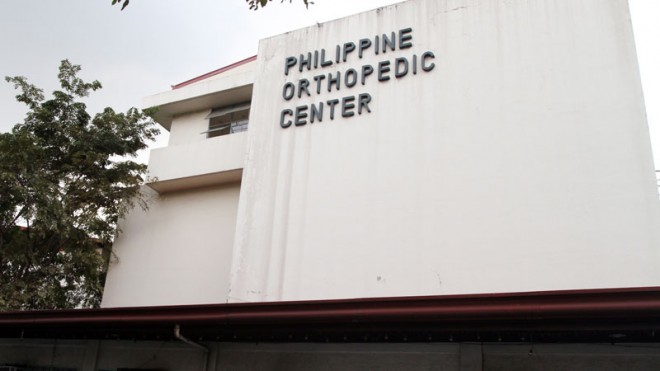
The Philippine Orthopedic Center. Can the state give up its duty to provide healthcare to the poor by allowing the country’s only hospital specializing in orthopedic care to be run by the private sector? INQUIRER FILE PHOTO
MANILA, Philippines—Can the state give up its duty to provide healthcare to the poor by allowing a government hospital, in this case, the country’s only hospital specializing in orthopedic care, to be run by the private sector?
This was the question that poor patients, employees of Philippine Orthopedic Center (POC), doctors, nurses, cause-oriented groups and three party-list lawmakers raised in asking the Supreme Court on Monday to stop the privatization of POC.
In a petition for certiorari and prohibition, they asked the high court to issue a preliminary injunction/temporary restraining order on the recent decision of Malacañang to privatize POC and award the build-operate-and-transfer (BOT) project to Megawide Construction Corp. and World Citi Inc.
President Aquino and Health Secretary Enrique Ona were among those named respondents in the petition.
“Petitioners availed [themselves] of this remedy because the public respondents committed grave abuse of discretion amounting to lack or excess of jurisdiction,” the petitioners said.
The petitioners included the National Orthopedic Hospital Workers’ Union-Alliance of Health Workers, Network Opposed to the Privatization of Public Hospitals and Health Services, Kilusang Mayo Uno, and Bayan Muna Rep. Neri Colmenares.
Novel questions
They said the “petition raises novel questions because it involves at first impression the fundamental question of whether the State’s responsibility to provide and ensure a basic social service, such as health, could be relinquished to a private entity through privatization or commercialization of a government hospital to the prejudice of the poor and underprivileged.”
At the center of the petitioners’ concern is POC, the country’s only hospital specializing in orthopedic cases, including spinal injury cases. POC, located on Banawe Street in Quezon City, had been ordered by the President to be included in the private-public partnership (PPP) program.
P5.69B compound
Two months ago, the Department of Health (DOH) announced it had awarded to Megawide-World Citi Consortium the project to modernize POC at a cost of P5.69 billion.
The consortium will build a 700-bed, super-specialty orthopedic hospital to be located within the compound of National Kidney and Transplant Institute in Quezon City.
Under the BOT arrangement, the consortium will design, build, finance, operate and maintain the facility until the end of the 25-year concession period, and then transfer the hospital to the DOH.
Moral duty
The petitioners said the government could not give up its constitutional and moral duty to provide affordable and accessible health services to the people.
They also contended that governmental health services should not be commercialized through the PPP program via the BOT law, saying that this would prejudice the people, especially the poor.
“In fact, previous experience and precedents have demonstrated that private-public partnerships in government hospitals have allowed the entry of private diagnostic and laboratory companies, private clinics and other private medical services companies to operate different hospital services, charging exorbitant fees that squeeze dry the hard-earned money from patients in public hospitals while depriving health services to those who cannot afford them at all,” the petitioners said.
They said this was the case because government hospitals and health facilities were “being run like big business entities to enhance revenues and amass big profits.”
Mostly service patients
The petitioners said POC’s privatization would deny medical services to thousands of Filipinos, noting that most of the patients at the hospital were “service patients,” and not “pay patients.”
In 2010, of the 6,579 patients admitted into POC, 80 percent were service patients and 4,326 were not members of the Philippine Health Insurance Corp. (PhilHealth).
“This means that POC is a poor man’s hospital … primarily serving the poorest of the poor of Filipinos and they receive treatment even if they are not covered by PhilHealth largely because they cannot afford to be members in the first place,” they said.
Only 70 beds for poor
The petitioners also said the private entity that would run POC would allot only 70 of the 700 beds to service patients, thus, denying expert medical care to those who could not pay and could not be accommodated beyond the 70-bed limit.
Emergency room and out-patient department services, which are now free of charge to poor patients, will be subjected to fees according to prevailing medical rates, they said.
Security of tenure imperiled
The petitioners claimed that POC’s privatization would violate the constitutional provisions that guarantee security of tenure.
Current POC employees have the option either to work in the new hospital, where there is no guarantee that they will be accepted and lose their permanent status as a civil service employee, or to choose to remain in government service and be transferred “to a place of work in wonderland that is not of their choosing.”
They also warned that the privatization of POC was an “ominous precursor to the 26 other government hospitals all over the country that are being fast-tracked for “corporatization.”
“That wild running train that would run over the already suffering public must be stopped,” the petitioners told the high court.
RELATED STORIES
SC urged to stop privatization of Philippine Orthopedic Center
Opponents of ‘privatized’ orthopedic center taking fight to SC
Workers restive over Orthopedic Center upgrade despite Ona’s assurance